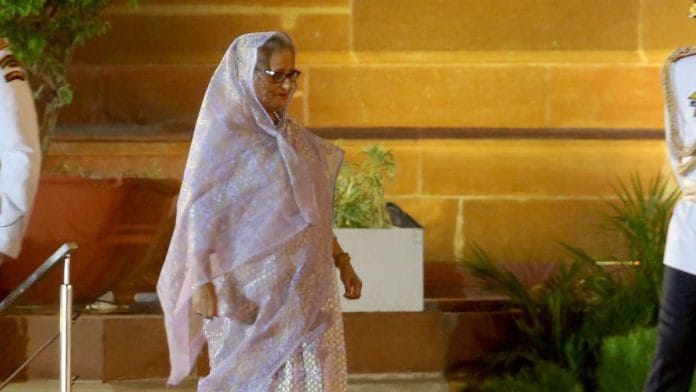New Delhi: A second warrant has been issued for the arrest of former prime minister Sheikh Hasina, who has been living in exile in India since her ouster in August 2024. This warrant, issued by Bangladesh’s International Crimes Tribunal, is linked to her alleged involvement in enforced disappearances of individuals when she was in power.
ICT’s arrest warrant also includes other individuals such as former defence adviser Major General (retd) Tarique Ahmed Siddique, and former inspector general of police, Benazir Ahmed. The tribunal, led by Justice Md Golam Mortuza Majumdar, has directed authorities to arrest Hasina and the other 10 individuals by 12 February.
The previous arrest warrant against Hasina was issued on charges of crimes against humanity.
ICT is a domestic war crimes tribunal in Bangladesh, set up in 2009 to investigate and prosecute suspects for the genocide committed in 1971 by the Pakistan Army and their local collaborators during the Bangladesh Liberation War.
The 77-year-old former prime minister had fled Bangladesh following an uprising led by student protesters, which toppled her 16-year-long rule. During her tenure, Hasina’s government faced widespread allegations of human rights violations, including mass detentions and extrajudicial killings of political opponents.
In November last year, the interim government, led by Mohammad Yunus, accused her government of abducting 3,500 citizens.
During the hearing, Islam told the tribunal that the Awami League had fostered a culture of state-sponsored enforced disappearances, with those responsible for carrying out these abductions being rewarded.
He also highlighted that agencies, such as the Rapid Action Battalion (RAB), Detective Branch (DB), Counter Terrorism and Transnational Crime (CTTC) unit, and Directorate General of Forces Intelligence (DGFI), were among the most frequently involved in these incidents during Hasina’s tenure.
The chief prosecutor told media persons that the next hearing for the case is scheduled for 12 February. “The court has issued an arrest warrant against Sheikh Hasina and 11 others, including her military adviser, security personnel, and law enforcement officials.”
Islam also highlighted that the court plans to proceed with the trial despite the absence of Hasina, reiterating the importance of ensuring due process. “We want to ensure the trial concludes as soon as possible, but that doesn’t mean we will bypass legal procedures or impose a verdict without due process.”
In November 2024, over a dozen former senior Bangladeshi government officials were arrested following Hasina’s ouster. They have been charged with “enabling massacres” and are facing trial before ICT. The tribunal had also given investigators one month to complete their probe into the allegations against Hasina.
Bangladesh’s interim government has repeatedly sought Hasina’s extradition from India. In December, Dhaka formally requested that India send the exiled leader back to face trial.
On Friday, India’s Ministry of External Affairs (MEA) confirmed receiving a formal extradition request from Bangladesh for Hasina. MEA spokesperson Randhir Jaiswal said, “We have confirmed that we have received a request from the Bangladeshi side on Hasina’s extradition. Beyond that, I have nothing further to add.”
The tribunal’s chief prosecutor had reportedly requested assistance from Interpol through Bangladesh’s police chief to arrest Hasina. While India is a member of Interpol, this does not obligate New Delhi to extradite her, as each country applies its own legal standards to determine whether an arrest should be carried out.
Meanwhile, the interim government has also moved forward with an investigation into the alleged irregularities in the elections held during Hasina’s rule.
Bangladesh’s election commission announced plans to examine electoral deficiencies, particularly in the 2014, 2018 and 2024 national elections, which have been viewed as highly controversial. For instance, the 2014 elections were boycotted by the opposition Bangladesh Nationalist Party (BNP), leading to a one-sided outcome, with 153 candidates elected unopposed.
Also Read: India ties based on ‘give and take’, China a ‘development partner’, says Bangladesh army chief






